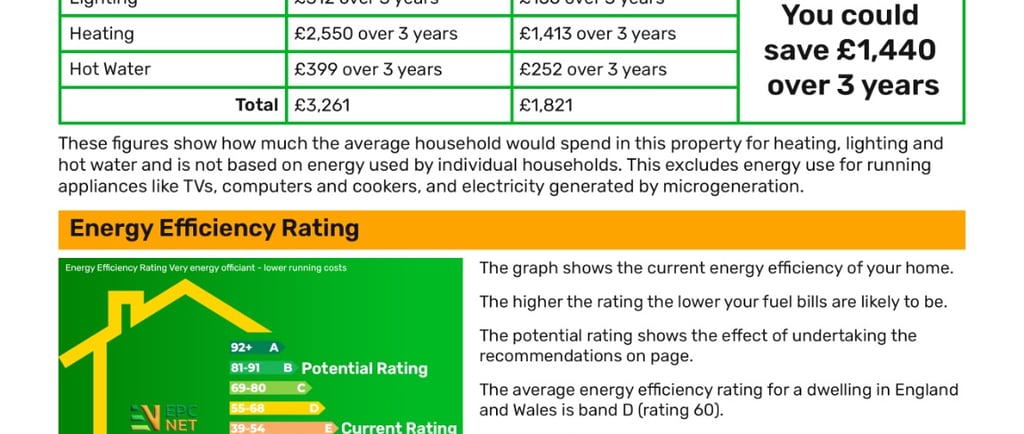EPC Certificate Cost: Key Factors That Influence Your Budget
Learn about EPC Certificate costs, including key factors that influence pricing. Understand how to manage your budget effectively for energy performance certifications.
David Stevens
8/9/20247 min read


Introduction
When you’re involved in selling, renting, or constructing a building, one of the essential things to consider is the Energy Performance Certificate (EPC) cost. An EPC is a document that shows how energy efficient a building is and gives it a rating from A (very efficient) to G (not efficient). This certificate is often required by law when a property is being sold or rented out. Understanding the cost of an EPC certificate is important because it directly impacts your overall project budget. In this article, we’ll explain what EPC certificates are, why they are important, and discuss the key factors that influence their cost. We will also provide tips on how you can manage these costs effectively.
What is an EPC Certificate?
An EPC, or Energy Performance Certificate, is an official report that rates the energy efficiency of a building. The certificate not only gives the building a rating but also includes recommendations on how the building’s energy efficiency can be improved.
Energy Efficiency Rating: This rating ranges from A (very efficient) to G (inefficient). A higher rating means the building is more energy-efficient, which can lead to lower energy bills and a smaller carbon footprint.
Improvement Recommendations: The EPC also provides suggestions on how to improve the building’s energy efficiency. These might include upgrading insulation, using energy-efficient lighting, or installing better heating systems.
EPC certificates are essential because they help owners, buyers, and tenants understand the energy performance of a building. This information is valuable not only for reducing energy costs but also for contributing to environmental sustainability.
Why is the EPC Certificate Important?
EPC certificates are important for several reasons:
Legal Compliance: In many countries, obtaining an EPC certificate is mandatory when selling or renting out a property. Failure to have one can result in fines and legal complications.
Energy Savings: An EPC certificate can guide you on how to make your building more energy-efficient, which can result in lower energy bills over time.
Environmental Impact: Energy efficiency is crucial in the fight against climate change. The recommendations provided in an EPC can help reduce the carbon footprint of your building.
Property Value: Properties with higher energy efficiency ratings can be more attractive to potential buyers or renters. This can potentially increase the value of your property.
Key Factors That Influence EPC Certificate Cost
The cost of obtaining an EPC certificate can vary based on several factors. Below, we discuss these key factors to help you understand what might affect the price.
1. Type of Property
The type of property you own is one of the biggest factors that affect the cost of an EPC certificate.
Residential Properties: Obtaining an EPC for a house or apartment tends to be less expensive. The assessment is straightforward and quick, which keeps costs lower.
Commercial Properties: EPC certificates for commercial buildings are usually more costly. These buildings are larger and more complex, requiring a more detailed assessment.
Industrial Properties: For industrial properties like factories or warehouses, the cost of an EPC can be higher due to the specialized energy systems that need to be assessed.
2. Size of the Property
The size of your property also plays a significant role in determining the cost of the EPC certificate.
Smaller Properties: Smaller properties, like a single-family home or a small office, generally have lower EPC costs because the assessment can be completed quickly.
Larger Properties: Larger properties require more time and effort to assess, leading to higher costs. The assessor needs to examine more areas, which increases the complexity of the job.
3. Location of the Property
The location of your property can also influence the EPC certificate cost.
Urban Areas: In cities and other urban areas, you may find more assessors available, leading to competitive pricing. However, the complexity of urban buildings might still result in higher costs.
Rural Areas: In more remote areas, fewer assessors may be available, which could increase the cost. Assessors might also charge extra for travel if your property is far from their base.
4. Age of the Property
The age of the property is another factor that can affect the cost of an EPC certificate.
Newer Properties: Newer buildings are typically easier to assess because they are likely to have modern energy systems. This can result in lower EPC costs.
Older Properties: Older buildings might have outdated energy systems, which require more time to assess, leading to higher costs. These buildings may also have more areas that need to be inspected.
5. Complexity of the Property
The complexity of your property’s design and energy systems can also impact the cost.
Simple Designs: Buildings with straightforward designs, such as single-story homes, are easier to assess and typically have lower EPC costs.
Complex Designs: Buildings with complex designs or those with multiple floors or unique architectural features require more detailed assessments. This complexity can increase the cost of the EPC.
6. Energy Systems in Place
The types of energy systems installed in the property can influence the cost of obtaining an EPC certificate.
Standard Energy Systems: Properties with standard energy systems, like conventional heating and cooling, are generally easier and cheaper to assess.
Advanced Energy Systems: Buildings with advanced or renewable energy systems, such as solar panels or geothermal heating, may require more in-depth assessments. This can result in higher EPC costs.
7. Assessor’s Experience
The experience and qualifications of the assessor you choose can also impact the cost.
Qualified and Experienced Assessors: Assessors with more experience or specialized qualifications may charge higher fees. However, their assessments are often more accurate and detailed.
Less Experienced Assessors: Assessors who are less experienced may charge lower fees, but the quality of their assessment might not be as high. It’s important to balance cost with quality to ensure a reliable EPC certificate.
8. Market Demand
Market demand for EPC certificates can influence pricing as well.
High Demand: During periods of high demand, such as when new regulations are introduced or when many properties are being sold or rented, assessors may increase their prices.
Low Demand: In times of lower demand, prices may be more competitive, and you may be able to obtain an EPC certificate at a reduced cost.
9. Regulatory Changes
Changes in laws or regulations can also affect the cost of obtaining an EPC certificate.
New Regulations: If new regulations require more detailed or frequent assessments, the cost of obtaining an EPC certificate may increase.
Stable Regulations: If regulations remain the same, the cost may not change significantly. However, it’s important to stay informed about potential regulatory changes that could impact your budget.
10. Urgency of the Assessment
The urgency with which you need the EPC certificate can also influence the cost.
Standard Processing: If you have the time to wait for the standard processing time, the cost will generally be lower.
Expedited Service: If you need the EPC certificate quickly, for example, to close a property sale, assessors may charge a higher fee for expedited service.
How to Manage EPC Certificate Costs
Managing the cost of obtaining an EPC certificate is important to keep your overall project budget under control. Here are some tips on how you can manage these costs effectively:
1. Plan Early
Start the process early to avoid rushed decisions that could increase costs.
Get Multiple Quotes: Contact several assessors to get quotes for their services. This allows you to compare prices and choose the best option for your budget.
Avoid Last-Minute Fees: By planning ahead, you can avoid paying extra for expedited services.
2. Choose the Right Assessor
Selecting the right assessor is key to managing costs.
Check Qualifications: Make sure the assessor is qualified to perform EPC assessments. Ask for references and check their credentials.
Consider Quality: While it’s important to keep costs down, don’t compromise on quality. A well-qualified assessor may charge more, but they will provide a more accurate and reliable certificate.
3. Understand Your Property’s Needs
Understanding the specific requirements of your property can help you manage costs.
Review Your Property: Before the assessment, review your property’s energy systems and overall design. This will help you understand what to expect and can potentially reduce costs.
Consider Improvements: If your property has obvious energy inefficiencies, consider making improvements before the assessment. This can lead to a better rating and potentially lower long-term costs.
4. Stay Informed About Regulations
Keep up-to-date with any changes in regulations that might affect the cost of obtaining an EPC certificate.
Monitor Regulatory Changes: Stay informed about new laws or changes to existing regulations that could impact your budget. This will help you plan ahead and avoid unexpected costs.
Compliance: Ensure that your property complies with current regulations to avoid penalties or additional costs.
5. Negotiate
Don’t be afraid to negotiate with assessors to get the best deal.
Discuss Pricing: Some assessors may be willing to negotiate their fees, especially if you’re obtaining multiple certificates or if your property is easy to assess.
Package Deals: If you need other services, such as building inspections or energy audits, consider negotiating a package deal to save on costs.
Real-World Examples of EPC Certificate Costs
To better understand how these factors can influence the cost of an EPC certificate, let’s look at some real-world examples.
Example 1: Small Residential Property
Type: Single-family home
Size: 1,500 square feet
Location: Suburban area
Energy Systems: Standard heating and cooling
Cost: £100 - £150
In this example, the cost is relatively low because the property is small, has standard energy systems, and is located in an area with competitive pricing.
Example 2: Large Commercial Property
Type: Office building
Size: 50,000 square feet
Location: Urban area
Energy Systems: Standard and renewable energy systems
Cost: £1,000 - £2,000
For a larger commercial property with more complex energy systems, the cost of obtaining an EPC certificate is significantly higher. The urban location and the building’s complexity contribute to the increased cost.
Example 3: Older Industrial Property
Type: Warehouse
Size: 100,000 square feet
Location: Rural area
Energy Systems: Outdated systems
Cost: £2,000 - £3,000
This example shows an older industrial property with outdated energy systems, which requires a more detailed assessment. The rural location may also increase the cost due to travel expenses for the assessor.
Conclusion
Understanding the cost of an EPC certificate is crucial for anyone involved in property sales, rentals, or construction. Several factors can influence the cost, including the type, size, location, and age of the property, as well as the complexity of its energy systems. By planning ahead, choosing the right assessor, and staying informed about regulations, you can effectively manage EPC certificate costs and keep your project on budget. Whether you own a small residential property or a large commercial building, taking the time to understand these factors will help you make informed decisions and avoid unnecessary expenses.
EPC Net is a company that provides Energy Performance Certificates (EPCs) Bassed in Croydon London, Our certified assessors evaluate the energy efficiency of homes, offering ratings from A to G and recommending improvements to enhance energy efficiency. This service is crucial for property sales, rentals, and regulatory compliance.
Copyright © 2026 epcnet.co.uk. All rights reserved.
Address:
125 Lower Addiscombe RD, CR06PU, CROYDON
Email: info@epcnet.co.uk
Mobile: 07874384147

